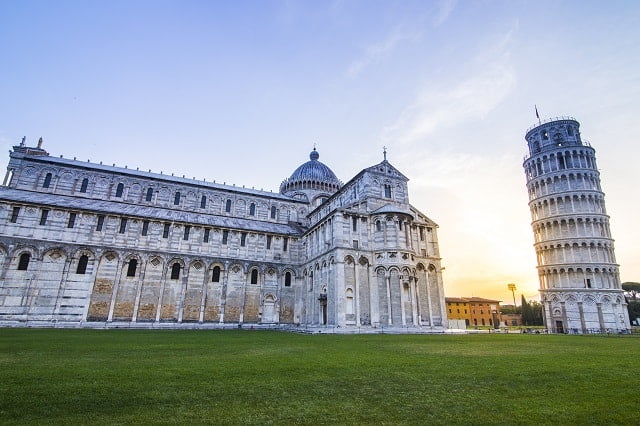Italy is known for its rich history, breathtaking landscapes, and delectable cuisine. Whether you’re planning a romantic getaway to Rome, exploring the picturesque canals of Venice, or indulging in delicious pasta dishes in Florence, learning Italian words related to travel can greatly enhance your experience. In this article, we will explore the importance of learning Italian for travelers and how knowing basic Italian words can elevate your trip to Italy to new heights.
When traveling to a foreign country, being able to communicate with locals is not only practical but also a sign of respect for their culture. Even if you don’t become fluent in Italian before your trip, knowing some basic greetings and phrases can make a world of difference.
From saying “Ciao” when entering a shop or restaurant to starting your mornings with a warm “Buongiorno,” these simple gestures can go a long way in building connections with the locals and immersing yourself in the Italian way of life.
Furthermore, knowing basic Italian words related to travel can help you navigate through different situations effortlessly. Imagine being able to confidently ask for directions when you’re lost or order your favorite pizza without any confusion.
Learning key phrases for transportation, accommodation, food, and tourist attractions can not only make your trip more convenient but also create memorable experiences that would have been otherwise missed. So whether you’re exploring ancient ruins or savoring authentic gelato, being equipped with the right language skills will undoubtedly make your journey through Italy all the more fulfilling.
Basic Italian Greetings and Phrases
Learning basic Italian greetings and phrases is essential for travelers who want to make the most out of their trip to Italy. Even if you don’t become fluent in Italian, knowing a few basic words can go a long way in enhancing your travel experience. Not only will it allow you to communicate with locals more effectively, but it will also show your respect for the local culture.
Essential Greetings
One of the first things you should learn when visiting Italy is how to greet people. The most common greeting is “Ciao,” which means both “hello” and “goodbye.” It’s a versatile phrase that you can use in almost any situation. Another useful greeting is “Buongiorno,” which means “good morning” or “good day.” This phrase is generally used until around mid-afternoon, after which it transitions to “Buonasera” meaning “good evening”.
Useful Phrases for Everyday Situations
In addition to greetings, it’s helpful to know some practical phrases for everyday situations. For example, if you need directions, you can say “Scusi, mi può aiutare?” meaning “Excuse me, can you help me?” If you want to order food at a restaurant, you can say “Posso avere il menu?” which translates to “Can I have the menu?” When shopping for souvenirs or essentials, saying “Quanto costa?” (“How much does it cost?”) will come in handy.
Understanding basic Italian words and phrases not only facilitates communication but also opens up opportunities for meaningful interactions with locals. Italians appreciate when visitors make an effort to speak their language and are often more willing to assist or engage in conversation. Remember that pronunciation plays a crucial role in effective communication. It’s beneficial to practice speaking these words and phrases aloud before your trip and be open-minded when encountering new vocabulary during your travels.
By learning basic Italian greetings and phrases, you will have a solid foundation to navigate day-to-day interactions in Italy and create a more immersive travel experience. The effort you put into learning the language will be rewarded with enhanced cultural exchange, a greater sense of connection to the country, and memorable encounters with locals. So don’t hesitate to embrace the Italian language – it will surely enrich your journey through Italy.
Transportation Vocabulary
When embarking on a trip to Italy, it is essential to familiarize oneself with transportation vocabulary. Knowing key Italian words related to transportation will not only make getting around easier but also enhance the overall travel experience. In this section, we will introduce some commonly used Italian transportation terms and provide examples of phrases for navigating public transportation and booking tickets.
One of the first things travelers should learn is how to say “train” in Italian, which is “treno.” Trains are a popular mode of transportation in Italy due to their efficiency and extensive network. Being able to recognize train stations and understand announcements can greatly facilitate travel within the country. Additionally, learning how to ask for directions to the train station or inquire about departure times can be immensely helpful.
For those planning long-distance travels or international trips, knowing how to say “airplane” in Italian is crucial. The word for airplane is “aereo.” Understanding airport-related vocabulary such as “arrivo” (arrival) and “partenza” (departure) can assist travelers when navigating airports. Moreover, being able to express one’s needs at the airport, whether it be checking in baggage or asking for assistance, will contribute to a smoother travel experience.
When it comes to local transportation within cities, taxis play a significant role. To hail a taxi in Italy, one should know that the word for taxi is also “taxi.” Communicating with taxi drivers requires understanding basic phrases such as stating your destination (“alla stazione ferroviaria,” meaning “to the train station”) or asking about fare estimations (“Quanto costa?”). These language skills ensure clear communication and help avoid any misunderstandings during rides.
Learning these fundamental transportation terms and phrases goes a long way in making travel more comfortable and enjoyable. By familiarizing oneself with these vocabulary words before setting off on an adventure in Italy, travelers can confidently navigate public transport systems, book tickets, and communicate their needs effectively. With transportation vocabulary under their belts, travelers will embark on a stress-free journey through the beautiful Italian landscape.
Accommodation Terminology
When traveling to Italy, one of the essential aspects to consider is accommodation. It is important to familiarize yourself with Italian words related to different types of accommodations in order to make informed decisions and have a comfortable stay. Here, we will explore some common Italian words for various types of accommodations and provide useful phrases for booking and checking into these places.
Firstly, let’s start with hotels. In Italian, the word for hotel is “albergo.” Whether you’re looking for a luxury hotel or a budget-friendly option, knowing this word will certainly come in handy when searching for accommodation.
If you prefer a more homely atmosphere during your trip, an apartment can be a great choice. In Italian, an apartment is referred to as “appartamento.” This type of accommodation provides more space and privacy, allowing you to truly immerse yourself in the local culture.
If you’re traveling on a tight budget or enjoy meeting fellow travelers from around the world, hostels are a popular option. In Italy, hostels are called “ostello.” These establishments usually offer dormitory-style rooms or private rooms at a lower cost compared to hotels and apartments. Staying in an ostello can be a great way to interact with people from different backgrounds and share travel experiences.
| English | Italian |
|---|---|
| Hotel | Albergo |
| Apartment | Appartamento |
| Hostel | Ostello |
Now that we have covered the basic terminology, let’s move on to some useful phrases for booking and checking into accommodations. When making a reservation, you can say “Vorrei prenotare un albergo/appartamento/ostello” which means “I would like to book a hotel/apartment/hostel.” Additionally, it is important to confirm the dates of your stay.
You can ask “Per quanto tempo?” which means “For how long?” It’s also useful to inquire about the amenities or specific requirements you may have by saying “Mi servirebbe ” (I would need ) followed by the necessary item or service.
When checking into your accommodation, you might be asked for identification. In this case, you can provide your passport by saying “Ecco il mio passaporto” which means “Here is my passport.” It is also common practice to pay for your accommodation upon check-in or check-out. To ask for the bill, simply say “Mi può dare il conto per favore?” which translates to “Can you give me the bill please?”.
By familiarizing yourself with these Italian words and phrases related to accommodations, you will be well-prepared for booking and checking into your chosen place of stay. This will not only enhance your travel experience but also enable smoother communication with the locals. So whether it’s a hotel room overlooking a picturesque canal or a cozy apartment nestled in a quaint neighborhood, embrace the charm of Italian accommodation during your trip. Buon viaggio (Have a good trip).
Restaurant and Food Vocabulary
When traveling to Italy, experiencing the local cuisine is a must. To fully immerse yourself in the culinary delights of the country, it is essential to learn some basic restaurant and food vocabulary in Italian. This will not only help you order your favorite dishes but also enable you to navigate menus and understand the dining experience better.
To start off, let’s explore some popular Italian dishes that you are likely to come across during your trip. Pasta dishes such as “spaghetti alla carbonara” (spaghetti with bacon, eggs, and cheese) or “lasagne al forno” (oven-baked lasagna) are classic staples. If you have a sweet tooth, don’t miss out on trying some authentic “gelato” (Italian ice cream) in various flavors like fragola (strawberry), cioccolato (chocolate), or limone (lemon).
Now, let’s move on to ordering food at restaurants. When you sit down at a restaurant in Italy, the most common phrase to use when asking for the menu is “posso avere il menù per favore?” which translates to “Can I have the menu please?”.
Once you have chosen what you want to eat, it’s time to call over the waiter with a polite “scusi” or “mi scusi” if addressing someone formally. To ask for the bill, simply say “il conto per favore”.
Navigating through a menu can be tricky if you are not familiar with certain terms used in Italian cuisine. For instance, antipasti refers to appetizers or starters while primi piatti includes first courses such as pasta or risotto dishes. Secondi piatti are main courses usually consisting of meat or fish options accompanied by a side dish known as contorno.
Pizzas come under their own category called pizza and are typically thin-crust and deliciously topped. Finally, dolci indicates desserts which could be anything from tiramisu to panna cotta.
Learning restaurant and food vocabulary will not only enhance your dining experience but also allow you to engage with locals and fully appreciate the unique gastronomy of Italy. So, make sure to practice these words and phrases before your trip and savor every bite during your culinary adventures in Italy.
Tourist Attractions and Sightseeing Vocabulary
This section will explore Italian words for famous landmarks, museums, and attractions that travelers may encounter during their trip to Italy. Knowing these words can enhance the travel experience by allowing travelers to communicate effectively with locals, ask about opening hours and ticket prices, and participate in guided tours. Here are some essential tourist attractions and sightseeing vocabulary words in Italian:
- Colosseo (Colosseum) – The iconic amphitheater located in Rome.
- Galleria degli Uffizi – A famous art museum in Florence that houses renowned masterpieces.
- Basilica di San Marco – The stunning cathedral situated in Venice’s St. Mark’s Square.
- Torre di Pisa (Leaning Tower of Pisa) – The leaning tower famously known for its architectural anomaly.
- Fontana di Trevi (Trevi Fountain) – A magnificent Baroque fountain located in Rome.
- Duomo di Milano (Milan Cathedral) – One of the largest Gothic cathedrals in the world, found in Milan.
In addition to knowing the names of these landmarks, it is also helpful to learn phrases related to visiting them:
– “A che ora apre?” (What time does it open?)
– “Quanto costa il biglietto?” (How much does the ticket cost?)
– “Ci sono tour guidati disponibili?” (Are there guided tours available?)
By knowing these vocabulary words and phrases, travelers can navigate tourist attractions more efficiently and make the most out of their sightseeing experiences in Italy.
It’s important to note that while English might be spoken at some tourist sites, not all locals or staff members might be fluent. Therefore, making an effort to learn basic Italian phrases and words can go a long way in interacting with locals and demonstrating respect for their language and culture.
Overall, learning Italian words related to tourist attractions and sightseeing can greatly enhance a traveler’s experience in Italy. It allows them to communicate effectively, ask questions, and fully immerse themselves in the rich history and culture of the country. So, don’t forget to brush up on these vocabulary words before embarking on your Italian adventure.
Emergency and Safety Words and Phrases
Importance of Emergency and Safety Words and Phrases
When traveling to a foreign country, it is important to be prepared for any unforeseen circumstances or emergencies that may arise. Learning emergency and safety words and phrases in Italian can greatly assist in these situations, ensuring that you can communicate effectively and seek the necessary help. Taking the time to familiarize yourself with these words and phrases will provide peace of mind and enable you to handle emergencies with confidence.
Essential Emergency Words
It is crucial to learn key emergency words in Italian so that you can quickly identify sources of help or report incidents. Some of the essential emergency words include:
- “Ospedale” (hospital): This word should be easily recognizable, as it sounds similar to its English counterpart. Knowing how to say this word could be vital if someone requires medical assistance.
- “Vigili del fuoco” (firefighters): In case of a fire or any other fire-related emergencies, knowing how to ask for the firefighters can save valuable time.
- “Polizia” (police): If you find yourself needing police assistance, knowing this word will enable you to report incidents or ask for their presence.
- “Ambulanza” (ambulance): It is always advantageous to know how to ask for an ambulance in case of a medical emergency.
Useful Safety Phrases
In addition to emergency words, learning safety phrases can also prove beneficial during your travels. Here are some useful safety phrases in Italian:
- “Mi sono perso/a” (I am lost): If you find yourself disoriented or unable to find your way, this phrase will help convey your situation.
- “Mi hanno rubato il portafoglio/borsa” (Someone stole my wallet/handbag): Unfortunately, theft can occur while traveling. Knowing this phrase will allow you to report the incident to authorities.
- “Ho bisogno di aiuto” (I need help): This phrase can be used in a variety of emergency situations, such as feeling unwell or being in immediate danger.
Remember, it is essential to remain calm and composed during an emergency. Knowing these words and phrases will enable you to communicate your needs effectively and seek appropriate assistance.
Learning Italian emergency and safety words and phrases is not only crucial for your own wellbeing but also out of respect for the local culture and people. By showing that you have taken the time to learn their language, Italians may be more inclined to offer assistance or go above and beyond to ensure your safety.
So, take the time to learn these important words and phrases before embarking on your next trip to Italy. Your preparation could make all the difference in ensuring a smooth travel experience.
Useful Traveler’s Phrases
In addition to basic greetings and essential vocabulary for transportation, accommodation, restaurants, and sightseeing, there are several other useful traveler’s phrases that can greatly enhance your travel experience in Italy. These phrases can help you navigate language barriers and communicate with locals more effectively.
One common situation that travelers often find themselves in is needing to find a bathroom. To ask where the bathroom is, you can use the phrase “Dov’è il bagno?” This simple question will come in handy when nature calls and you need to locate the nearest restroom. Similarly, “Posso usare il Wi-Fi?” (Can I use the Wi-Fi?) is a useful phrase for asking if you can access a wireless internet connection in cafes or accommodations.
Another important phrase to know is “Parli inglese?” which means “Do you speak English?” It’s always helpful to check if someone speaks English before attempting to communicate with them. While many Italians do speak English, especially in popular tourist areas, it’s appreciated when travelers make an effort to speak some Italian.
Additionally, knowing how to politely apologize or excuse yourself is important in any language. In Italian, “Scusi” means “Excuse me” or “I’m sorry.” You can use this phrase when trying to get someone’s attention or when accidentally bumping into someone on a crowded street.
To go beyond basic greetings and necessities, consider learning these additional traveler’s phrases. Not only will they help you navigate through various situations during your trip, but they will also show locals that you respect their culture and are making an effort to communicate with them on their terms.
Remember, practice makes perfect. Don’t be afraid to try out these phrases during your travels and embrace the opportunity to engage with locals using their native language.
Conclusion
In conclusion, learning Italian words related to travel is essential for a memorable trip to Italy. By familiarizing yourself with basic greetings and phrases, you can effortlessly connect with locals and create meaningful interactions. Additionally, transportation vocabulary will allow you to navigate Italy’s transportation systems with ease, ensuring a smooth journey from one destination to another.
Understanding accommodation terminology will enable you to confidently book and check into various types of lodgings, whether it be a hotel, apartment, or hostel. When dining out, having knowledge of restaurant and food vocabulary will enrich your gastronomic experience as you order traditional Italian dishes and seamlessly communicate with waitstaff.
Furthermore, learning tourist attraction and sightseeing vocabulary will enhance your exploration of Italy’s iconic landmarks and museums. By asking about opening hours, ticket prices, and guided tours in Italian, you’ll have a more immersive experience in each place you visit.
In times of emergency or safety concerns, knowing important Italian words related to emergencies and being able to seek help or report incidents becomes crucial for your well-being while traveling.
To truly embrace the Italian language is to immerse oneself in the culture and lifestyle of Italy. Learning useful traveler’s phrases allows you to navigate language barriers while engaging authentically with locals. By taking the time to learn key words and phrases before your trip, you can significantly enhance your travel experience by connecting on a deeper level with the people and places that make Italy so remarkable.

I’m a passionate traveler, writer, and Italophile. My fascination with Italy’s history, art, and culture has led me on countless adventures across the Italian landscape. Through “I Live Italy,” I share my love for this extraordinary country and aims to inspire others to explore its boundless beauty.





